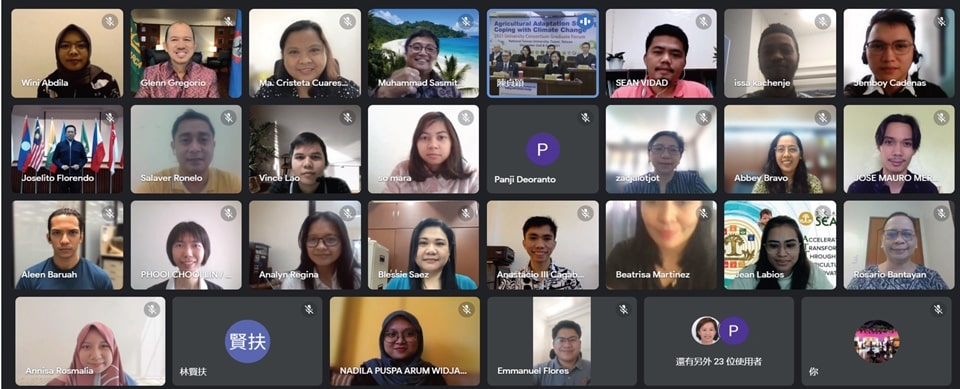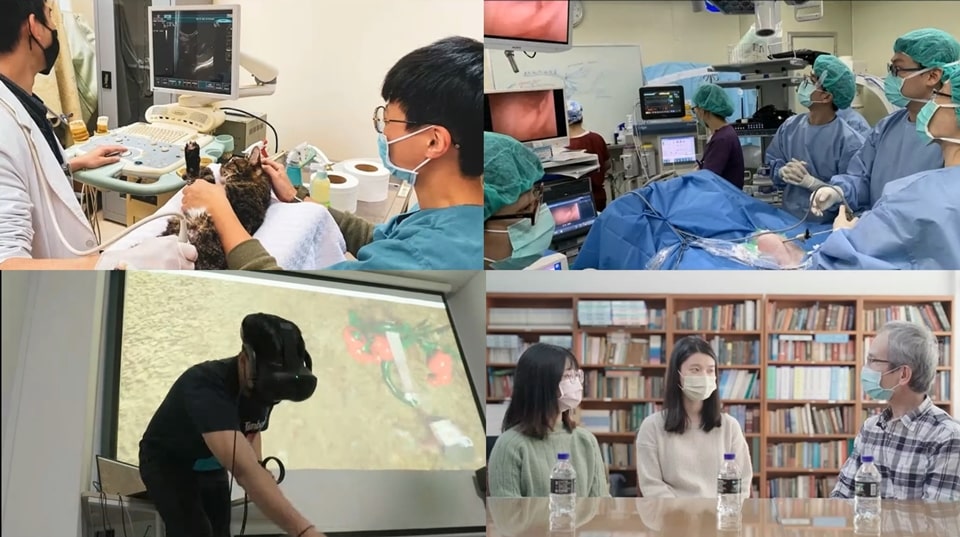
National Taiwan University (NTU) hosted the 7th UC Graduate Forum on 2-3 December 2021 with the theme, "Agricultural Adaptation Strategies for Coping with Climate Change." The event was attended by select graduate students from member universities, NTU, IPB University, Universitas Gadjah Mada (UGM), Universiti Putra Malaysia (UPM), University of the Philippines Los Baños (UPLB), Kasetsart University (KU), Universitas Brawijaya (UB), and Tokyo University of Agriculture (Tokyo NODAI). New Affiliate Members, Visayas State University (VSU), Central Luzon State University (CLSU), and Maejo University (MjU) also sent their students to join the forum, which marks their 1st activity with the UC. The Southeast Asian Regional Center for Graduate Study and Research in Agriculture (SEARCA) was also in attendance as Secretariat to the consortium.
The 7th UC Graduate Forum delved into the strategies and technologies developed and implemented in agriculture to cope with climate change. The graduate students presented their research based on four sub-themes, Making Crops Resilient to Climate Change, Sustainable agricultural management: Economic and marketing strategies and implications in the era of climate change, Smart Agriculture, and Challenge and opportunities of animal products. Dr. Huu-Sheng Lur, Dean of the College of Bioresources and Agriculture of NTU, welcomed the participants as host of the two-day forum on behalf of University President Prof. Dr. Chung-Ming Kuan.
Mr. Joselito G. Florendo, Deputy Director for Administration of SEARCA, underscored the importance of agriculture as the backbone of many economies that are constantly threatened by the effects of climate change. Building adaptive strategies to cope with these threats will help build the sector's resilience towards food security and alleviating poverty. As UC Secretariat, Deputy Director Florendo reinforces SEARCA’s support to strengthen agricultural adaptation strategies for coping with climate change through responsive programs and services embodied in its 11th Five Year Plan of Accelerating Transformation Through Agricultural Innovation or ATTAIN.
SEARCA Director Dr. Glenn B. Gregorio, in his Keynote Speech on having a Climate Change Ready Agriculture, highlighted the importance of sowing seeds of curiosity among the youth and re-thinking food security by supporting academe-industry-government models. Climate change in agriculture is a reality that the world contends with that needs interconnectivity among all actors, across sectors, at all levels. The youth play a vital role in achieving a transformative systemic change in the agriculture food system as they have the power to advocate for change and to hold decision-makers accountable.
The UC Graduate Forum saw 38 research studies presented by MS and PhD students. A total of 53 participants attended the virtual event. The best presentation was awarded to graduate students from UPLB, NTU, and MjU. Mr. Emmanuel C. Flores from the Department of Agribusiness Management and Entrepreneurship, College of Economics and Management, UPLB, shared his study on the Economic and Marketing Strategies for Small Island Communities in the Philippines: The Case for Sustainable Agriculture Amidst Climate Change. He discussed his observations on the value chains of copra and fish, the major export products of Jomalig and Patnanungan in the Philippines. Challenges identified include the difficulties in accessing livelihood capitals, unsustainable production practices, support services, and market systems. The study recommends the development of community-supported agriculture and agri-tourism, and product and market diversification, increasing farmers' income through value-added activities on traditional agricultural operations.
Ms. Marlen Trejo from the School of Renewable Energy of MjU shared her study on the development of fermentable sugars from fresh elephant ear plant weed for the manufacture of efficient bioethanol. The elephant ear plant is a potentially dangerous weed considered an invasive species. The study used it as a source of non-edible lignocellulosic biomass for bioethanol synthesis, which can be an effective feedstock plant for future bioethanol production.
Mr. Kang Wu from the Department of Animal Science and Technology of NTU presented his research on the Hepatoprotection of chicken-liver-hydrolysate based supplement (GBHP01TM) via accelerating blood alcohol clearance and antioxidant/anti-inflammatory abilities under alcoholism. His study transformed chicken livers, which are by-products of broiler slaughtering stream, into a nutraceutical ingredient through hydrolyzation. The research further discovered that the chicken-liver hydrolysate (CLH) based supplement can accelerate alcohol clearance in the body and lessen liver damage by enhancing antioxidative abilities and alcohol metabolism enzymes activities.

On the 2nd day of the forum, the College of Bioresources and Agriculture arranged a virtual tour of NTU’s facilities such as the Phytotron, Sensory Training Classroom, Center for Intelligent Agriculture Education and Research, Intelligent Management System for Dairy Cattle under Heat Stress, Apex Agriculture Intelligence Lab (AAI Lab), and the National Taiwan University Veterinary Hospital. Besides the facilities of NTU, the virtual tour also covered in-campus affiliations such as the Miaoli District Agricultural Research and Extension Station, Council of Agriculture, and the biotech company, CH Biotech.
Associate Dean Je-Ruei Liu expressed his appreciation to both participants, session chairpersons, and UC representatives for joining the forum as without their inputs, ideas, and discussion, the event will not be successful. The forum discussed issues brought by climate change in agricultural production, livestock production, and how resource-intensive farming systems and high input may not always result in productivity but lead to massive deforestation, water scarcity, soil degradation, and high levels of greenhouse gas emission, which worsens the climate crisis. He highlighted that it is necessary to build resilience for the agricultural sector as it is tied to livelihood, human health, and food security. The forum provided a great avenue to exchange ideas and opportunities for cooperation among member universities of the UC.
Dr. Maria Cristeta N. Cuaresma, Senior Program Head of the Education and Collective Learning Department (ECLD) and UC Coordinator for SEARCA, reinforced the keynote speakers’ call to transform and innovate agricultural strategies to adapt to the changing climate. She recognized the good things that have been shared and learned by the students. The UC further hopes that the participants found future collaborators during the forum and will nurture the networks they have established. The graduate forum is also a testament to the accomplishments of the participating universities.
The UCGF is an annual event that aims to provide an opportunity for graduate students from UC member institutions to share new knowledge, research ideas, and experiences in an open platform. It also encourages transdisciplinary studies and promotes greater integration of research through a strategic partnership among the UC members; and strengthens the relationship between and among the UC members. The event is also part and parcel of further strengthening the institutional ties between and among leading agricultural universities that comprise the membership of the UC towards the internationalization of higher education in the region.